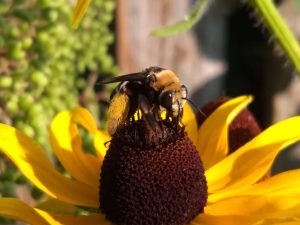What do you do in your current role with the University of Missouri?
I am a field specialist in horticulture in the Kansas City area. I coordinate the Extension Master Gardeners of Greater Kansas City, one of the three largest chapters in the state with over 400 motivated volunteers. We train and work with these volunteers to offer horticulture programing for the public, such as a gardening hotline, speakers bureau, children’s programming, 16 community gardens of various specialties and video creation for our YouTube channel. I also co-advise the Osage Trails chapter of the Missouri Master Naturalists.

I’m always working to bring communities together by offering horticultural programming. This includes horticulture presentations and training, consulting for urban farms, soil testing interpretation, and consulting on renovation of public spaces through natural environments, such as the historic N. Terrace Lake in Kessler Park.
I also work with Extension instructor Catherine Bylinowski to manage two grant-funded gardens. These gardens, in combination with food-producing Extension Master Gardener gardens, produced over 11,000 pounds of food for Kansas City food pantries and shelters in 2021. Additionally, because of my background and because we do not have a State Specialist in Urban Entomology, I serve as a resource for the state in this field.
How long have you worked in this position?
I joined MU Extension in August 2018, so it will be four years this summer.

What is your favorite part about the work you do?
There are so many things I enjoy: helping people, solving problems, making the world a better place, learning something new every single day and working with fantastic people.
How are you helping MU A&E Extension reach our #2xAg2030 goal?
I’m helping MU A&E reach the #2xAg2030 goal in a few ways. Helping farmers grow healthier crops means they will have more food to sell. In addition, by helping people learn to grow gardens, vegetable and ornamental, they and their families are healthier – physically, mentally, and financially. A healthier economy is a nice side effect of a healthy population. The connections and efforts made through the various programs offered, especially by the fantastic volunteers, are important and enhance opportunities for people while also improving the environment. More people in the Kansas City area are looking toward the University of Missouri as a source of research-based information. Hopefully, that also means more future tigers! MIZ!
What is something your CAFNR and MU Extension teammates may not know about you?
In my previous position with the USDA-ARS, I created insect cell lines that can be used for research. I developed fall armyworm and squash bug cell lines that can help scientists develop strategies to overcome the destruction from these two pests. While I have scientific papers to show this work, I’m better known for my “Kids Ask Dr. Bug” column published in the Kansas City Gardener
What is your hometown, place of high school graduation and degrees/universities?
I’ve lived all over the United States and currently call Blue Springs, Missouri home. I graduated from high school in Columbia, Missouri. My B.S. in horticulture is from Brigham Young University. And my Ph.D. in plant, insects, and microbial sciences (program area: entomology) is from the University of Missouri.
The Agriculture and Environment Program is a partnership between MU Extension and the College of Agriculture, Food and Natural Resources.